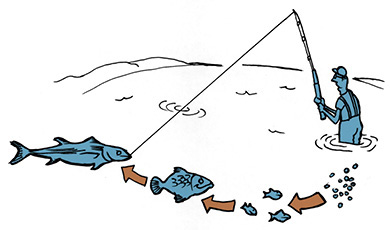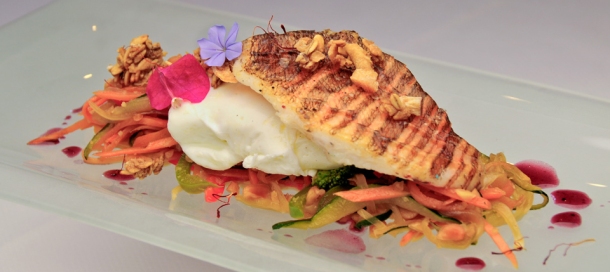Since lionfish invaded the Caribbean and Atlantic, there have been programs promoting the consumption of lionfish in an effort to control them. There have been lionfish cookouts following lionfish derbies, restaurants serving lionfish, and even fishermen selling and exporting lionfish filets. But in 2012, Florida Sea Grant and the FDA found detectable levels of ciguatera toxins, or “CTX’s”, in lionfish samples. Have lionfish been promoted as food when they are actually unsafe to eat? A recent study explores the lionfish ciguatera controversy and finally provides some answers.
What is ciguatera?

Bioaccumulation of Ciguatera http://www.fish.wa.gov.au
Ciguatera is a toxin produced by dinoflagellates, a type of plankton. The dinoflagellates that produce this toxin are found in tropical and subtropical regions such as the Caribbean and South Pacific islands. So how is a toxin produced by plankton a problem for humans? This toxin “bioaccumulates” meaning that small fish that eat seaweed covered with this plankton may gain a low amount of toxin, but medium fish that eat those small fish then gain a medium amount, and large predators that eat those medium fish now have a large amount of toxin that has built up by being passed up the food chain. The toxin doesn’t harm the fish, but it is harmful to humans when we eat the meat of “ciguatoxic” fish. It is colorless, odorless, and isn’t broken up by heat when fish are cooked. Ciguatera poisoning has no cure and causes gastrointestinal and neurological symptoms that usually go away within days or weeks. Lionfish aren’t necessarily “large predators” but they eat a lot of fish and a lot of different kinds of fish, so they are suggested to potentially act as “apex predators,” leading to the possibility that they can carry high amounts of ciguatera toxin.
Are lionfish toxic to eat?
A study by Florida Sea Grant and the FDA found ciguatera toxins in lionfish, yet there have been no reports of ciguatera poisoning from lionfish. So what is the real story? Are lionfish safe to eat or is it just a matter of time before someone gets poisoned from eating lionfish? A new study by Christie Wilcox and Dr. Mark Hixon provides an interesting explanation. If you have heard of a lionfish, you probably know that they contain venom in their spines that cause painful injuries. Interestingly, some of the symptoms of a lionfish “sting” are similar to those of ciguatera poisoning. This led researchers to wonder: are lionfish toxins and ciguatera toxins so similar that ciguatera tests on lionfish are inaccurate? They suggest that toxins found in lionfish spines can also be present in the tissues usually used to test for ciguatera. So if lionfish toxins are similar to ciguatera toxin, ciguatera tests may return false positives in lionfish. This sounds like good news: lionfish may not be positive for ciguatera after all. But wait, if there is just a different toxin causing the positive test results, is that really “good news”? Actually yes. There is one important difference between ciguatera toxin and lionfish toxins: ciguatera toxins don’t break down from the heat of being cooked, but lionfish toxins do. That is why lionfish spines are harmless, well other than their sharpness, after lionfish are cooked. This means that if lionfish toxins are found in the meat of lionfish, that meat is safe to eat once it is cooked. Researchers suggest that future ciguatera test should be performed on lionfish once they are cooked to get accurate results and clear up this controversy. Personally, I have eaten lionfish more times than I can count without any problems. I plan to continue eating lionfish whenever I can. They taste delicious and you can feel great about helping reefs while you eat them!

Reblogged this on The Little Biologist and commented:
I recently did a presentation on Lionfish spearing in the Caribbean and am supportive of the initiative to eat them. This is an interesting consideration, though, especially considering bioaccumulation would make sense in a species that preys on so many juveniles fish of other species. This is a great article, reminding me that “simple solutions” often require more in-depth research! I look forward to following this progression more.
LikeLike
Great article. It is interesting to learn more about the toxins being accumulated, and helped to give me some insight into the sustainability of Lionfish. As more information becomes available, I hope you’ll post it!
LikeLike
Thank you for your feedback and reblogging! I will definitely post more information as the research continues. We always appreciate suggestions/interests for future posts!
LikeLike
As someone who has had ciguatera poisoning quite badly (from Horse Eye Jack fish) I think the article badly underplays the risk of the illness in general. And as regards Lionfish, until testing on cooked fish HAS been done, I’d never recommend it no matter how eco-warrior it seems – ciguatera is confined to certain areas of certain reefs so testing is difficult and has to be frequent – you do not want to catch it, with possible risk of death, blindness, and in any case really excruciating nerve symptoms!
LikeLike
Thank you for sharing your opinion and I am so sorry to hear that you have experienced ciguatera poisoning. It was neither mine nor the researchers’ intention to downplay ciguatera poisoning in general, especially since it is the most common marine poisoning around the world. However, the question of lionfish and ciguatera poisoning is a unique one because of the toxins lionfish possess. This study provides a possible scientific reason why lionfish have tested positive for ciguatera, yet with all of the people who have eaten lionfish, there have been no reported cases of ciguatera poisoning from lionfish. Of course lionfish should be tested again for ciguatera after cooking, as the study suggests, to prevent anyone from going through such an unpleasant experience that you and many other ciguatera poisoning victims have had. Personally, though, I will continue to eat lionfish. My colleagues and I have enjoyed lionfish multiple times without incident. It is a delicious fish that is a nice alternative to eating ecologically important fish like snapper or grouper that unfortunately are often the primary seafood choice in many restaurants.
LikeLike
I guess I must be the first reported case of ciguatera from eating lion fish. I live on Anguilla and discovered lion fish in January .Since then I ate it often . The local fishermen filet them for me. It was the best fish I ever had. White meat and took well to sauces. In March I began having extreme fatigue my tongue started burning followed by my hands. Every time I touched cold water I would be in excruciating pain. I then started to have muscle weakness and brain fog. Finally I went to a Neuro specialist ( I never go to Drs if I can wait things out) anyway I was diagnosed as having ciguatera toxcicty. In a way I was relieved as I thought I had MS. I’m on blood pressure pills used for this type of toxin and Elavil at night for pain in hands and tongue.
Apparently there are lots of people around here that have lion fish poisoning. I guess not reported. I can’t have any fish ,shellfish or nuts for a year. I’m still in pain from the burning in my hands also weak , somedays better.
LikeLike
Pingback: Lionfish Derby at Green Parrot | Bahamas Food Services
Pingback: Coral research in Belize, a cultural melting pot. Field Season 2014 | UNder the C
Pingback: UNderthC’s Year in Review | UNder the C
Pingback: Florida Escapes Climate Change, And Why That’s Not Really Funny | UNder the C
Pingback: Two Years of UNdertheC! | UNder the C